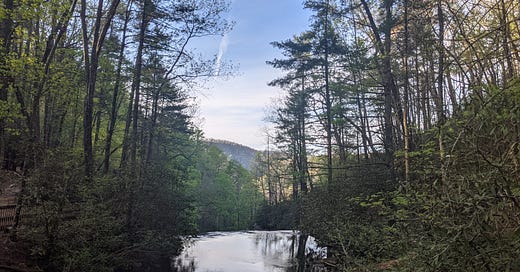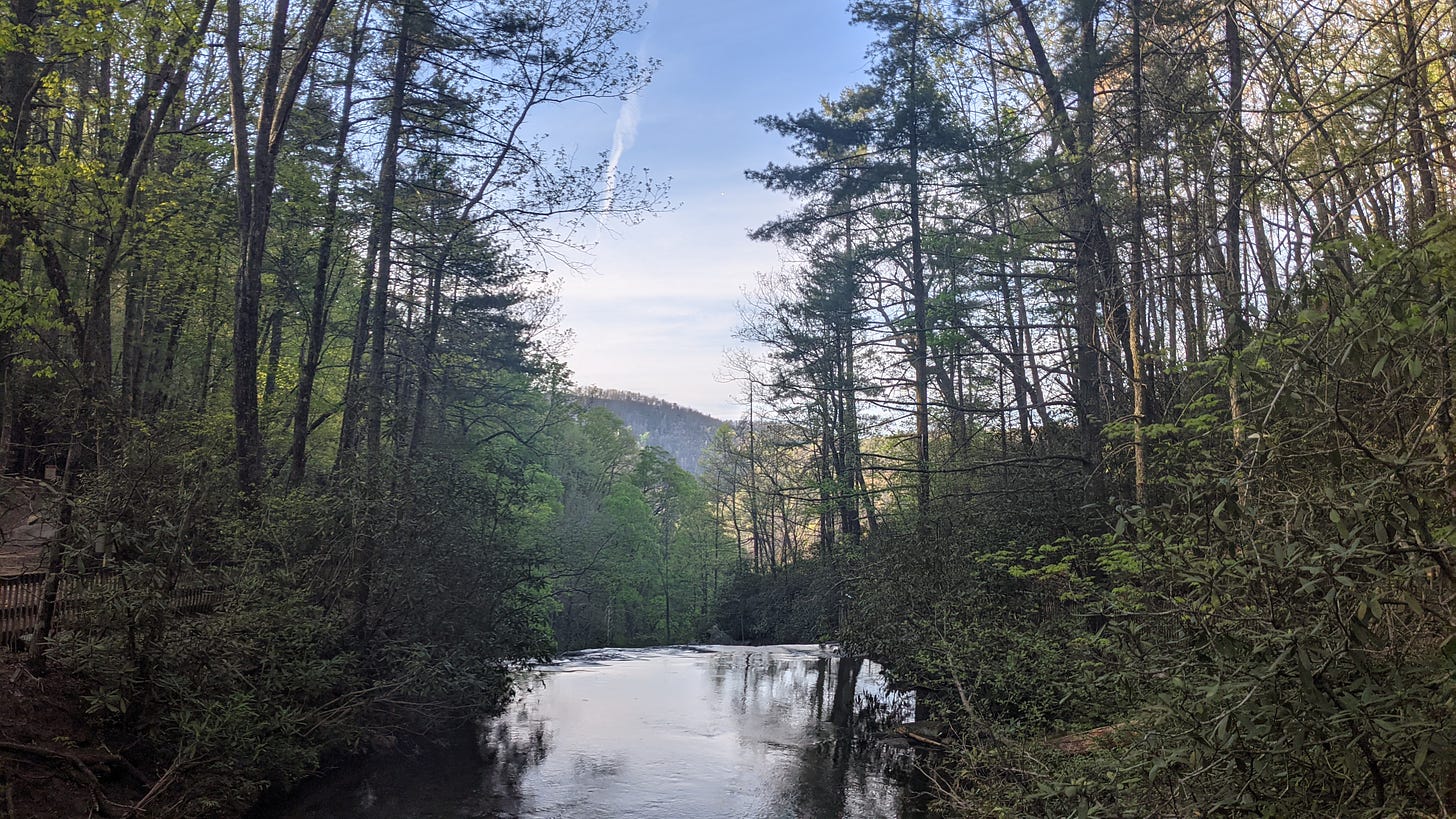Because in trying to articulate what, perhaps, joy is, it has occurred to me that among other things–the trees and the mushrooms have shown me this–joy is the mostly invisible, the underground union between us, you and me, which is, among other things, the great fact of our life and the lives of everyone and thing we love going away. If we sink a spoon into that fact, into the duff between us, we will find it teeming. It will look like all the books ever written. It will look like all the nerves in a body. We might call it sorrow, but we might call it a union, one that, once we notice it, once we bring it into the light, might become flower and food. Might be joy.
Ross Gay, The Book of Delights
One of the great joys of my life is talking with my friends who are [also] writers and poets, individually and together. I love when someone sends me a draft or a poem they haven't shared with anyone else. I have this folder on my desktop full of rough drafts and voice memos from friends. It's communion for me. I treasure the simplicity of "I want to share this with you - directly." I know that takes a lot of guts. And it feels cringy the first time you do it. But that's because we've gotten farther and farther away from the sound of what's genuine in each of us. Part of that is because we're bombarded with [horrible] news, reels, and click-bait, anything that will keep scrolling or fuming - as long as we stay on our phones.
In a clip from a 2019 panel on "Self Esteem in the Age of Social Media," comedian Bo Burnham describes how social media companies are out to colonize "every second of our lives": ~ "They're not even doing it consciously. It's because these companies, like Twitter, YouTube, Instagram, and everything, went public. They went to shareholders. So they have to grow. Their entire models are based on growth. They cannot stay stagnant. [They have to] get more of you."
So the glaring sound of what used to/should be white noise is always in the foreground, and what will heal us, bring light to our work/art, and foster connection and intimacy is something we have to listen to/for actively. We are made in and through these intimacies that we've forgotten how to engage in. So maybe the question to start with is: what are your intimacies? Or, what do you carry that you wish you could share? That's a genuine vulnerability and fear because we have been brainwashed to idolize hyper-independence and self-made[ness], which is just refusing to acknowledge that we are made of one another, of particular familiarities as opposed to these lavish achievements. So there's this sponge-like quality of being permeable in our vulnerability. We must be willing to let someone else's light and darkness enter our lives. [see Mikko Harvey’s: The number of hours we have together is actually not so large. Please linger near the door uncomfortably instead of just leaving. Please forget your scarf in my life and come back later for it.]
The hardest thing about welcoming difficult emotions is that we're [ culturally] condemned to try to deal with them privately. On our own, we will never open that door fully because they're too difficult a guest. So I think it's my job not just to be a good host to my sadness, joy, and despair - but to your sorrows, happiness, and grief. I think that’s everyone’s [true] task - to help others touch the heart of things. Otherwise, none of us can establish a form of intimacy or faculty with that simultaneous presence and emptiness without the others' hands holding us up. When we try to do it alone - we're left with that thin veneer of survival, performative vulnerability without transformation, just getting by - we’re basically pouring salt into the same wound over and over until we become septic from hypernatremia. The problem is we're taught we should endure grief but not that we should allow it to ripen and transform us. Either we engage it or try to outrun it - but of course, the trick is that it's impossible to outrun! It's got more feet [and teeth] than we do - it's much faster, and there's no way to avoid it in our lifetime. The psychologist James Hellman said the issue is never about resolution but spaciousness. It's about how large we can become by trying to get our arms, and perhaps when our arms can’t reach any further, our wings around these impossible questions. It’s not about having answers, but our ability to hold and touch difficult things without having a perfect solution or offering a trite platitude.
I'm coming to realize there's a direct relationship between the breadth of our sorrow and the capacity of our joy. If we mitigate - if we silence that grief, we also collapse the register of joy - which I can't live without. And joy is an imperative faculty in my life. Which is really what this essay is about. And I'm sure some of you are asking, how can you be talking about/pivoting to joy right now? Perhaps that's because we were conditioned to believe that joy and delight are not deep emotions. It's impossible to imagine, much less comprehend, the rigor behind those skills until we attempt to bring them into our lives [out of necessity]. In his Catalog of Unabashed Gratitude, Ross Gay offers a more enlightened version of joy that I have exclusively found in communities of recovery: which is the light that emanates from us when we help each other carry our sorrows. We're porous beings. Beauty hurts [Rilke believed this so much that he said we're barely able to endure it]. Attachments are painful. But they both transcend time and space so that we can meet in the intersection of eternity and the here & now. I believe every gesture happens within that fullness, the kind Weil was talking about with "The divine emptiness, fuller than fullness, has come to inhabit us." & "Grace fills empty spaces, but it can only enter where there is a void to receive it, and it is grace itself which makes the void." In his latest book, Inciting Joy, Gay skillfully grounds Weil's inquiry like he was fielding it with a baseball mitt and asks: "What if joy is not only entangled with pain, or suffering, or sorrow, but is also what emerges from how we care for each other through those things?" Such revelations invite a "soft, mutual, curious, groundless witnessing" of grief as the "metabolization of change."
Gay believes, as do I, that joy can, and perhaps only truly emerges" [...] from our common sorrow—which does not necessarily mean we have the same sorrows, but that we, in common, sorrow—might draw us together. .[..] It might depolarize us and de-atomize us enough that we can consider what, in common, we love. And though attending to what we hate in common is too often all the rage (and it happens also to be very big business), noticing what we love in common, and studying that, might help us survive."
Obsession, isolation, and addiction all orbit a singular point or fixation on shame, loneliness, depression, hopelessness, or grief - and the tighter our orbit, the harder it is to escape that trajectory. At some point, everyone has found themselves unable to escape the gravity of immense loss - and all we can do at this point is hold on for dear life and pray we will end up on the other side of it. Of course, despite our best efforts, we will always return to the thing, but that gravity can only rip us apart if we remain untethered from each other. And I'm discovering that while it might be a little uncomfortable, these small needful acts of paying attention, asking questions, delighting in and with each other, and being a little cringe can and will stitch us together. Like this small gift of a text from my friend, Leah live quoting Ada Limon's Q&A from Transylvania University earlier this week: "You love this world. You are in it. Don't miss it."
The deepest joys are those we share, and I don't want to miss them. I love you. Our friendship is a miracle. As Rilke wrote, I yearn to be held in the great hands of your heart; just as I hold you in mine.
PS: please send me your favorite poem.




my favourite poem is still, i think, snow and dirty rain by siken